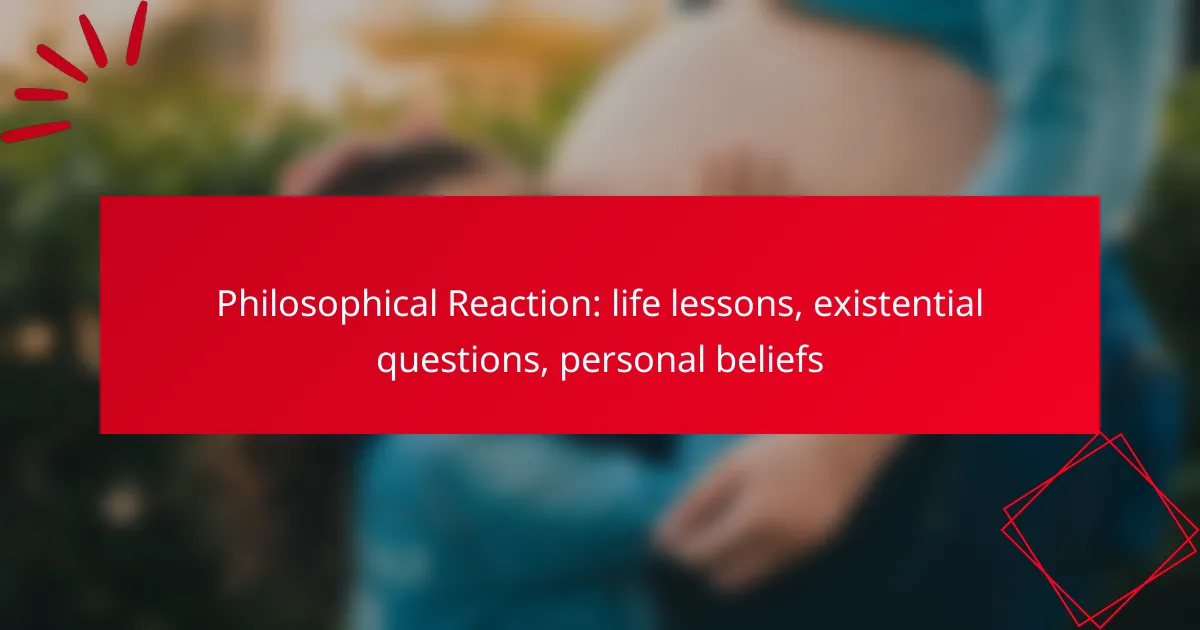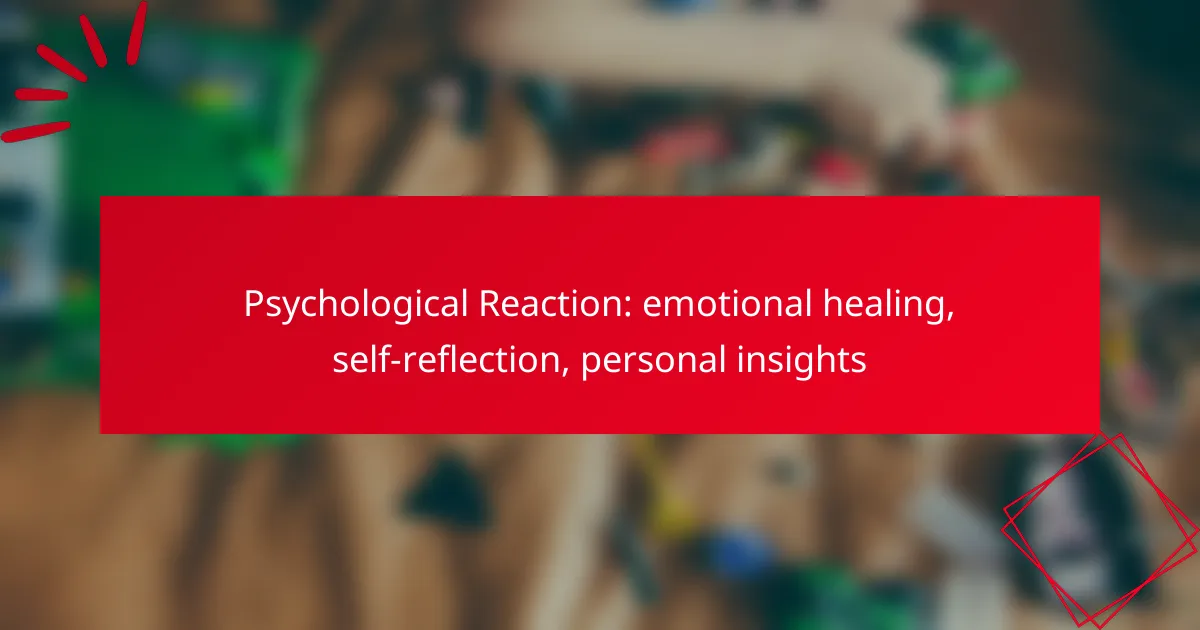Philosophical reactions offer profound insights into life lessons that encourage resilience, self-reflection, and empathy. By grappling with existential questions, individuals can explore their purpose and values, ultimately reshaping their personal beliefs and ethical frameworks.

What life lessons can we learn from philosophical reactions?
Philosophical reactions provide valuable insights into life lessons that emphasize resilience, self-reflection, and the importance of empathy. By engaging with these concepts, individuals can cultivate a deeper understanding of themselves and their relationships with others.
Resilience through adversity
Resilience is the ability to bounce back from challenges and setbacks. Philosophical teachings often highlight that adversity can be a powerful teacher, encouraging personal growth and strength. Embracing difficulties can foster a mindset that views obstacles as opportunities for development.
For example, many individuals find that facing hardships, such as job loss or personal loss, can lead to a renewed sense of purpose. Strategies like maintaining a positive outlook, seeking support, and practicing gratitude can enhance resilience during tough times.
Importance of self-reflection
Self-reflection is crucial for personal growth and understanding one’s beliefs and values. Philosophical reactions encourage individuals to regularly assess their thoughts and actions, leading to greater self-awareness. This practice can help clarify goals and align actions with personal values.
To incorporate self-reflection, consider setting aside time each week for journaling or meditation. Asking questions like “What have I learned from my experiences?” or “How do my actions align with my values?” can deepen insights and promote meaningful change.
Value of empathy and connection
Empathy and connection are essential components of a fulfilling life. Philosophical perspectives often stress the importance of understanding others’ experiences and emotions, which fosters stronger relationships and community bonds. Cultivating empathy can lead to more compassionate interactions and a supportive environment.
To enhance empathy, practice active listening and seek to understand different viewpoints. Engaging in community service or group activities can also strengthen connections with others, reinforcing the idea that we are all part of a larger human experience.

How do existential questions shape personal beliefs?
Existential questions significantly influence personal beliefs by prompting individuals to reflect on their purpose, values, and the nature of existence. These inquiries often lead to a deeper understanding of oneself and can reshape moral and ethical frameworks.
Influence on moral frameworks
Existential questions challenge individuals to consider the foundations of their moral beliefs. By questioning what is right or wrong, people may reassess their values and align them more closely with their personal experiences rather than societal norms. This process can lead to a more authentic moral framework that resonates with their true self.
For example, someone grappling with the question of what constitutes a meaningful life might prioritize compassion and empathy over material success. This shift can result in a commitment to social justice or community service, reflecting a personal moral evolution.
Role in identity formation
Engaging with existential questions plays a crucial role in shaping one’s identity. As individuals explore their beliefs about existence, they often discover new aspects of themselves that influence their self-concept and life choices. This exploration can lead to a more cohesive and resilient identity.
For instance, a person who contemplates the meaning of life may find that their identity is closely tied to their passions, such as art or science. This realization can inspire them to pursue careers or hobbies that align with their newfound understanding, reinforcing their sense of self and purpose.

What are common existential questions faced in Australia?
In Australia, common existential questions often revolve around the search for purpose, the nature of existence, and beliefs about life after death. These inquiries reflect a blend of cultural influences, including Indigenous perspectives and Western philosophies.
What is the meaning of life?
The meaning of life is a deeply personal question that varies significantly among individuals in Australia. Many Australians find purpose through relationships, career fulfillment, and contributions to their communities.
Philosophical perspectives, such as those from existentialism, suggest that meaning is not inherent but created through choices and actions. Engaging in activities that align with personal values can enhance one’s sense of purpose.
To explore your own meaning of life, consider reflecting on what brings you joy, fulfillment, and connection. Journaling or discussing these thoughts with trusted friends can also provide clarity.
Is there life after death?
Beliefs about life after death in Australia are diverse, influenced by various religious and spiritual traditions. Some Australians adhere to Christian beliefs that promise eternal life, while others may lean towards secular views that see death as the end of consciousness.
Indigenous Australian cultures often have rich spiritual beliefs that include concepts of ancestors and the land, suggesting a form of continuity beyond physical existence. Engaging with these cultural narratives can provide insight into different perspectives on life after death.
To navigate this topic personally, consider exploring different philosophies and faiths, and reflect on how these beliefs resonate with your own experiences and values. Open discussions with others can also broaden your understanding.

How can philosophical concepts be applied to everyday life?
Philosophical concepts can be integrated into daily routines to enhance decision-making, emotional resilience, and personal growth. By applying these ideas, individuals can navigate challenges with greater clarity and purpose.
Practical applications of Stoicism
Stoicism teaches the importance of focusing on what you can control while accepting what you cannot. This mindset can help reduce anxiety and improve emotional stability in stressful situations.
To apply Stoicism practically, start each day by identifying potential challenges and determining your response to them. For example, if you anticipate a difficult conversation at work, prepare your thoughts and focus on maintaining composure rather than worrying about the outcome.
Common pitfalls include overthinking or becoming overly rigid in your expectations. Instead, practice flexibility and remind yourself that setbacks are part of life.
Using existentialism for personal growth
Existentialism encourages individuals to find personal meaning and authenticity in their lives. This philosophy can foster a deeper understanding of your values and motivations, leading to more fulfilling choices.
To utilize existentialism, regularly reflect on your beliefs and what gives your life purpose. Journaling can be a helpful tool for exploring these thoughts. Consider asking yourself questions like, “What truly matters to me?” or “How do I define success?”
Avoid the trap of nihilism, which can arise from existential questioning. Instead, embrace the idea that you have the power to create meaning in your life, regardless of external circumstances.

What frameworks help in understanding philosophical reactions?
Frameworks for understanding philosophical reactions include various philosophical schools and decision-making models that guide individuals in navigating existential questions and personal beliefs. These frameworks provide structured approaches to analyze thoughts and feelings about life, morality, and existence.
Comparative analysis of major philosophies
Major philosophies such as existentialism, utilitarianism, and stoicism offer distinct perspectives on human experience. Existentialism emphasizes individual freedom and choice, suggesting that people create their own meaning in an inherently meaningless world. Utilitarianism focuses on the greatest good for the greatest number, advocating for actions that maximize overall happiness.
Stoicism teaches resilience and emotional control, encouraging individuals to accept what they cannot change while focusing on their responses. Comparing these philosophies can reveal how different beliefs shape reactions to life’s challenges and ethical dilemmas.
Decision-making models based on philosophical beliefs
Decision-making models influenced by philosophical beliefs can guide individuals in making choices aligned with their values. For instance, a utilitarian approach might involve evaluating potential outcomes to choose the option that benefits the most people, while a deontological perspective would emphasize adherence to moral rules regardless of the consequences.
When applying these models, it’s essential to consider the context and potential trade-offs. A common pitfall is neglecting the long-term effects of decisions in favor of immediate benefits. Developing a checklist of personal values can help ensure that decisions reflect one’s philosophical beliefs effectively.

How do personal beliefs influence decision-making?
Personal beliefs significantly shape decision-making by guiding individuals on what they consider right or wrong, valuable or trivial. These beliefs act as a framework through which choices are evaluated, impacting everything from daily habits to major life decisions.
Impact on lifestyle choices
Personal beliefs directly affect lifestyle choices, including diet, exercise, and leisure activities. For instance, someone who values health may prioritize organic foods and regular workouts, while another who emphasizes convenience might lean towards fast food and minimal exercise.
Additionally, beliefs about sustainability can influence choices such as using public transport over driving or opting for eco-friendly products. Understanding these influences can help individuals align their daily actions with their core values, leading to a more fulfilling life.
Effect on interpersonal relationships
Beliefs play a crucial role in shaping interpersonal relationships by determining how individuals interact with others. For example, someone who values honesty may prioritize transparency in friendships, while another who values harmony might avoid confrontation, even at the cost of honesty.
Moreover, differing beliefs can create friction in relationships, particularly if they involve fundamental issues like politics or religion. Recognizing these differences and approaching conversations with empathy can foster stronger connections and mutual respect, even among those with opposing views.



